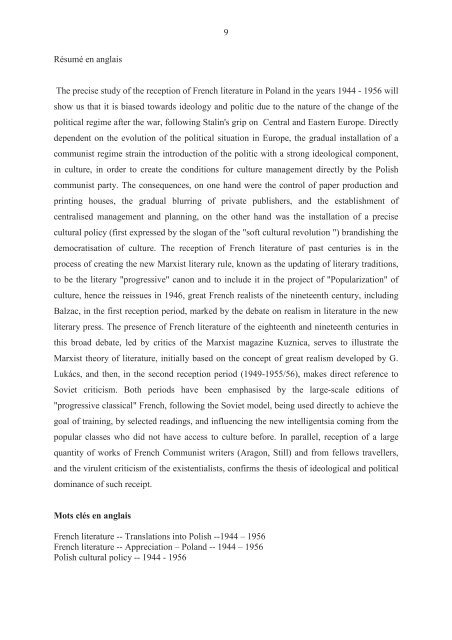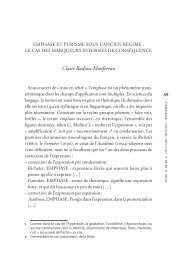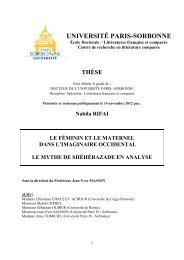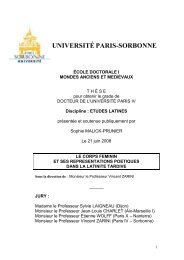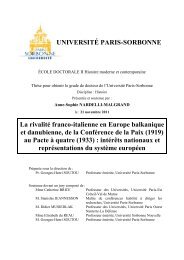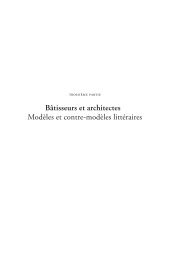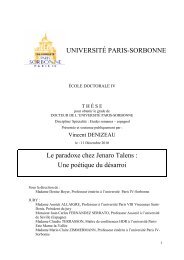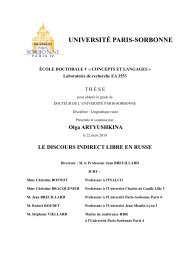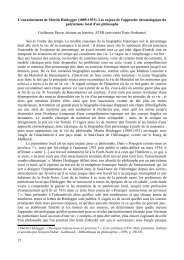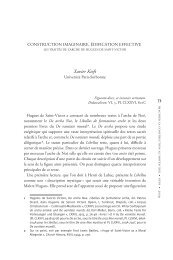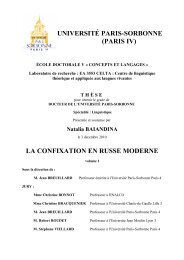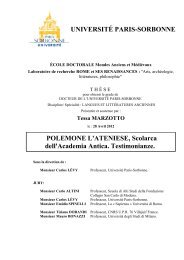- Page 1: 1 UNIVERSITÉ PARIS-SORBONNE ÉCOLE
- Page 5: 5 Remerciements Mes premiers remerc
- Page 11: Transcription et translittération
- Page 14 and 15: 14 4.4 : La réception de la litté
- Page 16 and 17: 16 - PSL - Polskie Stronnictwo Ludo
- Page 18 and 19: 18 son existence, les articles crit
- Page 20 and 21: 20 Le troisième corpus de document
- Page 22 and 23: 22 propos de l’histoire politique
- Page 24 and 25: 24 Orientale ayant subi l’introdu
- Page 26 and 27: 26 [...] seule l’étude du matér
- Page 28 and 29: 28 Michel Collot exprime l’idée
- Page 30 and 31: 30 Dans la décennie suivante, 1960
- Page 32 and 33: 32 Paczkowski, et édité par l’I
- Page 35 and 36: 35 Première partie : Conditions de
- Page 37 and 38: 37 Américains et les Anglais lui l
- Page 39 and 40: 39 Il a également profité de manq
- Page 41 and 42: 41 partis communistes français et
- Page 43 and 44: 43 Les structures du système commu
- Page 45 and 46: 45 la protection d’un guide infai
- Page 47 and 48: 47 ‘venir en aide aux frères de
- Page 49 and 50: 49 imposer « une mise au pas polit
- Page 51 and 52: 51 Pendant la période de 1945 à 1
- Page 53 and 54: 53 névralgique de Vilnius, fut tra
- Page 55 and 56: 55 Il n’était question, remarque
- Page 57 and 58: 57 Les communistes, portés au pouv
- Page 59 and 60:
59 droite ont été rayés des list
- Page 61 and 62:
61 également, dans les relations a
- Page 63 and 64:
63 La nouvelle Constitution du 22 j
- Page 65 and 66:
65 régime et pour la lutte contre
- Page 67 and 68:
67 Forts de l’«appui total» de
- Page 69 and 70:
69 L’enseignement du catéchisme
- Page 71 and 72:
71 soviétiques. Le Congrès a vot
- Page 73 and 74:
73 organisé, en septembre 1944 la
- Page 75 and 76:
75 Pendant la première étape de l
- Page 77 and 78:
77 Les nouvelles formes d’organis
- Page 79 and 80:
79 vie culturelle du pays et le pou
- Page 81 and 82:
81 passé stalinien : le commandant
- Page 83 and 84:
83 tristesse de Françoise Sagan a
- Page 85 and 86:
85 qui s’expliquait par la convic
- Page 87 and 88:
87 réalisaient des actions région
- Page 89 and 90:
89 successives ont été accompagn
- Page 91 and 92:
91 Quand, en 1949, la méthode du r
- Page 93 and 94:
93 scientifiques qui y faisaient ob
- Page 95 and 96:
95 expériences du PPR pendant la g
- Page 97 and 98:
97 n’étaient pas précisés à c
- Page 99 and 100:
99 Au même moment se déroulait à
- Page 101 and 102:
101 Leur réalisation ne tardera pa
- Page 103 and 104:
103 pays, ółkiewski a souligné q
- Page 105 and 106:
105 La construction du socialisme r
- Page 107 and 108:
107 Par ailleurs, Turowicz a remarq
- Page 109 and 110:
109 politiques et culturelles, ains
- Page 111 and 112:
111 décisions des organes du pouvo
- Page 113 and 114:
113 CZPZG) regroupait environ 340 i
- Page 115 and 116:
115 des conditions de vie des écri
- Page 117 and 118:
117 concernant les possibilités d
- Page 119 and 120:
119 espérés, du moment que les é
- Page 121 and 122:
121 du réseau national de biblioth
- Page 123 and 124:
123 des milieux scientifiques et le
- Page 125 and 126:
125 choix ne tenant compte que de c
- Page 127 and 128:
127 période de stalinisme dans la
- Page 129 and 130:
129 période et 2 dans la deuxième
- Page 131 and 132:
131 (tirage global de 161 000 exemp
- Page 133 and 134:
133 les « bibliothèques mobiles
- Page 135 and 136:
135 « En 1949, ils menaient les d
- Page 137 and 138:
137 Première partie : Conditions d
- Page 139 and 140:
139 République polonaise (reconnu
- Page 141 and 142:
141 A la réunion de Szklarska Por
- Page 143 and 144:
143 Gouvernement Provisoire pour co
- Page 145 and 146:
145 même évolution que le reste d
- Page 147 and 148:
147 Pour atteindre le grand public,
- Page 149 and 150:
149 fortes, processus qui aboutit
- Page 151 and 152:
151 propagande culturelle français
- Page 153 and 154:
153 Le traité prévoyait la collab
- Page 155 and 156:
155 occidental qui pouvait présent
- Page 157 and 158:
157 Dans la période 1944 - 1946, l
- Page 159 and 160:
159 bien des étudiants de la « ro
- Page 161 and 162:
161 françaises envoyées se monte
- Page 163 and 164:
163 communistes du gouvernement Ram
- Page 165 and 166:
165 selon la note trouvée dans les
- Page 167 and 168:
167 Polonais vis-à-vis des contenu
- Page 169 and 170:
169 Sur le plan international, c’
- Page 171 and 172:
171 rôle essentiel dans cette stra
- Page 173 and 174:
173 Le climat de détente n’a cep
- Page 175 and 176:
175 trois ans. Comme nous l’avons
- Page 177 and 178:
177 l’Institut Français en janvi
- Page 179 and 180:
179 Le théâtre de Jacques Fabbri
- Page 181 and 182:
Introduction 181 Première partie :
- Page 183 and 184:
183 veillait au développement de l
- Page 185 and 186:
185 Même un simple survol de l'abo
- Page 187 and 188:
187 communiste, ont élaborer leur
- Page 189 and 190:
189 imposée du début à la fin au
- Page 191 and 192:
191 l'impression, que c'est justeme
- Page 193 and 194:
193 « Le réalisme socialiste a co
- Page 195 and 196:
195 rythme variable - forçant le p
- Page 197 and 198:
197 Cette proximité, doublée d'un
- Page 199 and 200:
199 A part les grands débats, il y
- Page 201 and 202:
201 « Au moment de l'introduction
- Page 203 and 204:
203 un homme qui doit tout au nouve
- Page 205 and 206:
205 littérature est fascinatoire q
- Page 207 and 208:
207 Deuxième partie : Réception C
- Page 209 and 210:
209 Georg Lukács a vécu en Union
- Page 211 and 212:
211 A Moscou, Lukács assiste aux d
- Page 213 and 214:
213 monde. La vision de la réalit
- Page 215 and 216:
215 facteur objectif. Le choix de l
- Page 217 and 218:
217 dans la littérature dans la Po
- Page 219 and 220:
219 Il juge que sa conception est d
- Page 221 and 222:
221 (beobachten). L’observation d
- Page 223 and 224:
223 Lukács qualifie de décadentes
- Page 225 and 226:
225 Lukács a basé sa définition
- Page 227 and 228:
227 Dans une lettre de Goethe à Sc
- Page 229 and 230:
229 Lukács s’insurge contre ce d
- Page 231 and 232:
231 d’observateur […] n’est p
- Page 233 and 234:
233 favorise, gêne, ou empêche un
- Page 235 and 236:
235 En fait, les citations de Marx,
- Page 237 and 238:
237 l’absence, dans les réflexio
- Page 239 and 240:
239 parcelle de plus en plus grande
- Page 241 and 242:
241 « La résignation philosophiqu
- Page 243 and 244:
243 Lukács est arrêté peu après
- Page 245 and 246:
245 Bulgarie et la RDA adoptent une
- Page 247 and 248:
247 et insiste sur la catégorie du
- Page 249 and 250:
249 Josef Révai, critique littéra
- Page 251 and 252:
251 Henri Lefebvre a exprimé la co
- Page 253 and 254:
253 stalinienne et d’avoir rejoin
- Page 255 and 256:
255 Kott est incontestablement le c
- Page 257 and 258:
257 (PPR) a réussi à opérer une
- Page 259 and 260:
259 la vie culturelle et artistique
- Page 261 and 262:
261 Il faut attendre deux années p
- Page 263 and 264:
263 pendant laquelle le Premier Sec
- Page 265 and 266:
265 L’explication la plus simple
- Page 267 and 268:
267 Deuxième partie : Réception C
- Page 269 and 270:
269 ancienne. Car il est impossible
- Page 271 and 272:
271 Stefan ółkiewski lui-même -
- Page 273 and 274:
273 Matuszewski, Mieczysław Jastru
- Page 275 and 276:
275 assez poussé, une période où
- Page 277 and 278:
277 Les émotions que le débat sur
- Page 279 and 280:
279 sur le réalisme : il s’agiss
- Page 281 and 282:
281 Hanna Gosk fait la même analys
- Page 283 and 284:
283 l’occupation soviétique depu
- Page 285 and 286:
285 Le fait de mentionner l’envoi
- Page 287 and 288:
287 Pour les écrivains et les scie
- Page 289 and 290:
289 futur. Les écrivains ont besoi
- Page 291 and 292:
291 Wa yk, elles appartiennent à u
- Page 293 and 294:
293 « Les uns et les autres [il s
- Page 295 and 296:
295 a été précédée par une pé
- Page 297 and 298:
297 clair que dans la vie sociale l
- Page 299 and 300:
299 ne se feront pas attendre. Ains
- Page 301 and 302:
301 chercheur en histoire littérai
- Page 303 and 304:
303 recourir au réalisme dans la l
- Page 305 and 306:
305 régime avec la gauche polonais
- Page 307 and 308:
307 l’écriture journalistique et
- Page 309 and 310:
309 Il y a donné sa vision du réa
- Page 311 and 312:
311 correspondant au manque de réa
- Page 313 and 314:
313 Kott, conscient des enjeux et d
- Page 315 and 316:
315 Maritain, dont il attribue l’
- Page 317 and 318:
317 cet aspect pouvait être en mê
- Page 319 and 320:
319 rédaction, tout cela faisait e
- Page 321 and 322:
321 dynamique, qui possède une exi
- Page 323 and 324:
323 Les grands classiques du réali
- Page 325 and 326:
325 La réécriture des œuvres lit
- Page 327 and 328:
327 Kisielewski cite quelques « h
- Page 329 and 330:
329 constater. L’impact de ces di
- Page 331 and 332:
331 interprétation subjective. Les
- Page 333 and 334:
333 du réalisme socialiste. » 693
- Page 335 and 336:
335 polonais dont l’importance da
- Page 337 and 338:
337 « La tradition du romantisme [
- Page 339 and 340:
339 Il a eu également des répercu
- Page 341 and 342:
341 L’actualisation des tradition
- Page 343 and 344:
343 démocratisation de la culture
- Page 345 and 346:
345 concernait de près ou de loin
- Page 347 and 348:
347 sélection négative concernait
- Page 349 and 350:
349 années de l’immédiat après
- Page 351 and 352:
351 par rapport aux époques litté
- Page 353 and 354:
353 donné comme modèle pour la li
- Page 355 and 356:
355 critique de Ku nica, et même d
- Page 357 and 358:
357 audacieuses et révélatrices.
- Page 359 and 360:
359 comme nous l’avons vu, le cri
- Page 361 and 362:
361 certaines œuvres littéraires
- Page 363 and 364:
363 difficultés que l’actualisat
- Page 365 and 366:
365 intellectuel impossible à comb
- Page 367 and 368:
367 maniérisme, imagisme, psycholo
- Page 369 and 370:
369 d’essais consacré essentiell
- Page 371 and 372:
371 cléricalisme, les barrières d
- Page 373 and 374:
373 néanmoins surestimée. Le crit
- Page 375 and 376:
375 C’est quand les œuvres de Da
- Page 377 and 378:
377 Il aborde le rôle des Lumière
- Page 379 and 380:
379 radicales qui ont débouché, p
- Page 381 and 382:
381 penchant pour le rationalisme.
- Page 383 and 384:
383 appelées aussi « révolutionn
- Page 385 and 386:
385 superficielle des situations »
- Page 387 and 388:
387 Les retombées de cet événeme
- Page 389 and 390:
389 idéologiques relatifs à la cu
- Page 391 and 392:
391 à la conclusion que certains c
- Page 393 and 394:
393 « progressives » ou de « ré
- Page 395 and 396:
395 vécu le processus de formation
- Page 397 and 398:
397 „La première année après l
- Page 399 and 400:
399 Dans le même article, le criti
- Page 401 and 402:
401 Wyka considérait que certaines
- Page 403 and 404:
403 strictes et de la censure omnip
- Page 405 and 406:
405 documents, ne suffisaient plus,
- Page 407 and 408:
407 En délimitant soigneusement le
- Page 409 and 410:
409 Tolstoï ou de Gorki. Alors, on
- Page 411 and 412:
411 « composition » de l’œuvre
- Page 413 and 414:
413 Même si, comme nous l’avons
- Page 415 and 416:
415 Zbigniew Herbert 830 commentait
- Page 417 and 418:
417 trente volumes - s’ajoutant
- Page 419 and 420:
419 crois qu’il faudrait adopter
- Page 421 and 422:
421 Pour les rééditions littérai
- Page 423 and 424:
423 peuvent être difficiles, mais
- Page 425 and 426:
425 „Le plus grand siècle de la
- Page 427 and 428:
427 Misanthrope) dans la traduction
- Page 429 and 430:
429 pour la première fois dans l
- Page 431 and 432:
431 Les Illusions perdues sont paru
- Page 433 and 434:
433 Les hésitations de Kott par ra
- Page 435 and 436:
435 Powszechny et critique très pr
- Page 437 and 438:
437 „Je réunis ces titres et ces
- Page 439 and 440:
439 les plans éditoriaux, mais don
- Page 441 and 442:
441 tradition, surtout à la tradit
- Page 443 and 444:
443 ceux qui figuraient sur la list
- Page 445 and 446:
445 par les critiques de Ku nica, e
- Page 447 and 448:
447 Section des éditions du Minist
- Page 449 and 450:
449 L’action des rééditions des
- Page 451 and 452:
451 voulu dans la sphère de la cul
- Page 453 and 454:
453 « classiques » étrangers son
- Page 455 and 456:
455 cette voie. C’était bien dan
- Page 457 and 458:
457 Deuxième partie : Réception C
- Page 459 and 460:
459 venir, ou encore de « la révo
- Page 461 and 462:
461 la littérature française des
- Page 463 and 464:
463 une guerre différente de celle
- Page 465 and 466:
465 de l’équilibre, la règle de
- Page 467 and 468:
467 drame et la comédie romantique
- Page 469 and 470:
469 La représentation de l’Écol
- Page 471 and 472:
471 d’introduire le nouveau proje
- Page 473 and 474:
473 Deuxième partie : Réception C
- Page 475 and 476:
475 Comme nous l’avons vu lors de
- Page 477 and 478:
477 courantes de l’après-guerre
- Page 479 and 480:
479 l’après-guerre et l’époqu
- Page 481 and 482:
481 évinçaient ou faisaient de l
- Page 483 and 484:
483 inclus dans la première éditi
- Page 485 and 486:
485 l’URSS) pendant l’occupatio
- Page 487 and 488:
487 vie culturelle (presse, éditio
- Page 489 and 490:
489 connaissances sur l’époque e
- Page 491 and 492:
491 Il réclamait d’urgence un no
- Page 493 and 494:
493 des partages. Kukurowski rappel
- Page 495 and 496:
495 quotidiennes, indispensables, f
- Page 497 and 498:
497 est « la continuation de ses p
- Page 499 and 500:
499 infrastructure et d’un résea
- Page 501 and 502:
501 Le véritable enjeu des consid
- Page 503 and 504:
503 grands hommes pleins d’intell
- Page 505 and 506:
505 français du XVIIIe siècle ill
- Page 507 and 508:
507 titre et celui entre Mademoisel
- Page 509 and 510:
509 articles de Ku nica de l’imm
- Page 511 and 512:
511 „ La philosophie du fatalisme
- Page 513 and 514:
513 continue des hypothèses les pl
- Page 515 and 516:
515 pas le didactisme du traité ph
- Page 517 and 518:
517 même à son caractère « prog
- Page 519 and 520:
519 semble-t-il, à Diderot - encyc
- Page 521 and 522:
521 Dans l’Entretien de d’Alemb
- Page 523 and 524:
523 peinture en France et qu’ils
- Page 525 and 526:
525 dans Przekrój. 1073 Parmi ces
- Page 527 and 528:
527 l’obscurantisme et le despoti
- Page 529 and 530:
529 dans ‘Monitor’ [premier pé
- Page 531 and 532:
531 Cet exemple illustre bien les c
- Page 533 and 534:
533 Jan Kott ne s’est pas écart
- Page 535 and 536:
535 style a disparu dans le tourbil
- Page 537 and 538:
537 de Kubacki, paru dans Odrodzeni
- Page 539 and 540:
539 traductions du philosophe fran
- Page 541 and 542:
541 bibliographie 1116 signale les
- Page 543 and 544:
543 Dans la situation politique et
- Page 545 and 546:
545 les revues dépouillées, et qu
- Page 547 and 548:
547 traduction intégrale du Contra
- Page 549 and 550:
549 progressistes dans l’après-g
- Page 551 and 552:
551 Deuxième partie : Réception C
- Page 553 and 554:
553 bien le « retour au réalisme
- Page 555 and 556:
555 difficile chez les écrivains d
- Page 557 and 558:
557 et du roman historique : le pre
- Page 559 and 560:
559 Un des sujets présents dans le
- Page 561 and 562:
561 L’objectif de l’actualisati
- Page 563 and 564:
563 l’aboutissement d’un proces
- Page 565 and 566:
565 méthode du réalisme socialist
- Page 567 and 568:
567 la Seine) et Czytelnia najnowsz
- Page 569 and 570:
569 également publié une étude c
- Page 571 and 572:
571 de la relation amoureuse de Bal
- Page 573 and 574:
573 « [...] l’œuvre de Balzac
- Page 575 and 576:
575 du « cinquième » type d’é
- Page 577 and 578:
577 d’assimilation d’œuvres li
- Page 579 and 580:
579 dans ses romans, sur les mécan
- Page 581 and 582:
581 amorcée dès la fin de la guer
- Page 583 and 584:
583 du Père Goriot et de Julien So
- Page 585 and 586:
585 Le deuxième article de Ku nica
- Page 587 and 588:
587 « Je pense que cela se passe a
- Page 589 and 590:
589 Par la même occasion, Hertz é
- Page 591 and 592:
591 Le troisième article, signé p
- Page 593 and 594:
593 entre la situation et l’atmos
- Page 595 and 596:
595 donné l’absence d’articles
- Page 597 and 598:
597 fragments du Dictionnaire des i
- Page 599 and 600:
599 suite à la confiscation du rom
- Page 601 and 602:
601 troisième texte - « Après la
- Page 603 and 604:
603 Les trois textes présentés pa
- Page 605 and 606:
605 ont pourtant été supervisés
- Page 607 and 608:
607 cas, c’était elle qui « mod
- Page 609 and 610:
609 réédité le roman Pierre et J
- Page 611 and 612:
611 même niveau - pour les années
- Page 613 and 614:
613 déposée par la maison d’éd
- Page 615 and 616:
615 « nouvelle version abrégée
- Page 617 and 618:
617 Deuxième partie : Réception C
- Page 619 and 620:
619 Le nom de Sartre est cité pour
- Page 621 and 622:
621 Elles témoignaient plutôt que
- Page 623 and 624:
623 chaque geste étaient - face à
- Page 625 and 626:
625 Le numéro 26 d’Odrodzenie ap
- Page 627 and 628:
627 général de structure, qui fix
- Page 629 and 630:
629 belle œuvre de plus qui s’ap
- Page 631 and 632:
631 convient mieux à la classe ouv
- Page 633 and 634:
633 Désormais donc l’existential
- Page 635 and 636:
635 d’anéantir toutes les valeur
- Page 637 and 638:
637 recherche d’une « zone » si
- Page 639 and 640:
639 Quant au désespoir dans lequel
- Page 641 and 642:
641 cywilizacji. » 1302 . Brucz co
- Page 643 and 644:
643 Brucz considère qu’il faut o
- Page 645 and 646:
645 Un autre article, intitulé «
- Page 647 and 648:
647 fond, pour ne pas dire de prét
- Page 649 and 650:
649 Deuxième partie : Réception C
- Page 651 and 652:
651 Minuit » qui publiait illégal
- Page 653 and 654:
653 troupes de blindés en 1940, s
- Page 655 and 656:
655 impossible que les lecteurs vis
- Page 657 and 658:
657 contre la mécanisation excessi
- Page 659 and 660:
659 savants de participer au renouv
- Page 661 and 662:
661 sur le réalisme. Ils étaient
- Page 663 and 664:
663 « La poésie française a cess
- Page 665 and 666:
665 premiers numéros de 1946, la r
- Page 667 and 668:
667 couches sociales, divisées aup
- Page 669 and 670:
669 essentiellement par ses poésie
- Page 672 and 673:
672 « PIW » en 1954 1347 . Ainsi,
- Page 674 and 675:
674 l’introduction de Boy- ele sk
- Page 676 and 677:
676 La deuxième réédition de l
- Page 678 and 679:
678 premier plan, ont accompagné c
- Page 680 and 681:
680 musique, la médecine. Rabelais
- Page 682 and 683:
682 considère-t-elle. Son écritur
- Page 684 and 685:
684 Les députés communistes ont s
- Page 686 and 687:
686 L’auteur de l’article prés
- Page 688 and 689:
688 malentendu de parler de son mat
- Page 690 and 691:
690 « naturalisme plat » tant cri
- Page 692 and 693:
692 Nous disposons de plusieurs rap
- Page 694 and 695:
694 lacunes dans sa formation marxi
- Page 696 and 697:
696 La présentation des articles c
- Page 698 and 699:
698 Dans l’article de Ku nica, pa
- Page 700 and 701:
700 officiel porte-voix du Vatican,
- Page 702 and 703:
702 La tradition philosophique qui
- Page 704 and 705:
704 Desanti parcourt l’évolution
- Page 706 and 707:
706 dialectique. L’auteur de l’
- Page 708 and 709:
708 annonce le principe fondamental
- Page 710 and 711:
710 à l’ancienne manière tradit
- Page 712 and 713:
712 dramatiques français de son é
- Page 714 and 715:
714 n’ont pas publié d’article
- Page 716 and 717:
716 „Il est difficile d’ignorer
- Page 718 and 719:
718 que pendant la révolution l’
- Page 720 and 721:
720 expérimentés, abusaient. Néa
- Page 722 and 723:
722 1922 1481 , a été rééditée
- Page 724 and 725:
724 paraître sous peu. Pour ceux q
- Page 726 and 727:
726 « progressistes » ont été r
- Page 728 and 729:
728
- Page 730 and 731:
730 signalés par Stanisław Kukuro
- Page 732 and 733:
732 „[...] de plus en plus de pri
- Page 734 and 735:
734 „Il était donc possible de b
- Page 736 and 737:
736 L’année 1955 a été propice
- Page 738 and 739:
738 La monographie de Stanisław Ku
- Page 740 and 741:
740 Parvi évoque la monographie d
- Page 742 and 743:
742 ensemble, ils témoignent de l
- Page 744 and 745:
744 problème de connaissance et de
- Page 746 and 747:
746 Le premier, manuscrit, daté du
- Page 748 and 749:
748 constitue une unité de l’art
- Page 750 and 751:
750 D’après l’analyse du cense
- Page 752 and 753:
752 « esquisse le germe de la conc
- Page 754 and 755:
754 En 1955, Ewa Rzadkowska, qui a
- Page 756 and 757:
756 français est extrait ce fragme
- Page 758 and 759:
758 fanatisme de l’Église cathol
- Page 760 and 761:
760 diffusion dans les bibliothèqu
- Page 762 and 763:
762 par « Panst. Zakład Wydawnict
- Page 764 and 765:
764 mode, du tape-à-l’œil monda
- Page 766 and 767:
766 des aspirations de la bourgeois
- Page 768 and 769:
768 bourgeoisie. Il trouve cependan
- Page 770 and 771:
770 Nous sommes loin du jugement de
- Page 772 and 773:
772 Rostworowski, Celina Bobi ska -
- Page 774 and 775:
774 extrêmes considèrent les œuv
- Page 776 and 777:
776 est que c’est la Renaissance
- Page 778 and 779:
778
- Page 780 and 781:
780 stalinisation. Dans ce contexte
- Page 782 and 783:
782 Szkoła klasyków, la descripti
- Page 784 and 785:
784 (appelée aussi plus communéme
- Page 786 and 787:
786 Dans l’immense œuvre de Defo
- Page 788 and 789:
788 suggère que c’est leur grand
- Page 790 and 791:
790 un pamphlet, une satire, une ac
- Page 792 and 793:
792 géométrie, dans le Discours d
- Page 794 and 795:
794 d’abord et avant tout dans so
- Page 796 and 797:
796 Kott remarque que cette vision
- Page 798 and 799:
798 version abrégée, dans Odrodze
- Page 800 and 801:
800 nouvelle idéologie, pour attir
- Page 802 and 803:
802 Kott va encore plus loin dans s
- Page 804 and 805:
804 moral dans les fins optimistes
- Page 806 and 807:
806 Dans l’essai portant le titre
- Page 808 and 809:
808 « L’Appareil d’État de la
- Page 810 and 811:
810 cette façon, près de vingt an
- Page 812 and 813:
812 l’esprit de compromis. En gé
- Page 814 and 815:
814 possibilités et les moyens d
- Page 816 and 817:
816 donné et dans des conditions d
- Page 818 and 819:
818 la période de l’accumulation
- Page 820 and 821:
820 cette opposition entre la révo
- Page 822 and 823:
822 progressiste que le féodalisme
- Page 824 and 825:
824 des mouvements paysans indépen
- Page 826 and 827:
826 synthèses concernant, entre au
- Page 828 and 829:
828 guerre, on peut raisonnablement
- Page 830 and 831:
830 culturelle du Parti, sachant ce
- Page 832 and 833:
832 présente la genèse du roman b
- Page 834 and 835:
834 davantage ses activités sur le
- Page 836 and 837:
836 permis d’accélérer certaine
- Page 838 and 839:
Réception de Balzac 838 L’année
- Page 840 and 841:
840 La remarque que Hertz fait sur
- Page 842 and 843:
842 persuadé que les projets d’u
- Page 844 and 845:
844 (Wojciech Natanson a parlé de
- Page 846 and 847:
846 Après des déclarations géné
- Page 848 and 849:
848 Thorez, Louis Aragon, la France
- Page 850 and 851:
850 Un autre quotidien, Wolno (Libe
- Page 852 and 853:
852 milliers vivaient des histoires
- Page 854 and 855:
854 Rastignac, Lucien de Rubempré,
- Page 856 and 857:
856 attribuant cette conviction à
- Page 858 and 859:
858 de le publier ou non. Habituell
- Page 860 and 861:
860 Nous avons traduit l’ensemble
- Page 862 and 863:
862 français. Le projet de commém
- Page 864 and 865:
864 « Victor Hugo » dans les éco
- Page 866 and 867:
866 2) Des soirées littéraires da
- Page 868 and 869:
868 faisait partie du projet. Ainsi
- Page 870 and 871:
870 Il a envoyé, à la même perso
- Page 872 and 873:
872 bourgeoisie française ne pouva
- Page 874 and 875:
874 l’humanité progressiste. L
- Page 876 and 877:
876 Hugo appelle à créer une litt
- Page 878 and 879:
878 Dans ce cas précis, nous avons
- Page 880 and 881:
880 publique, ou une mise au point
- Page 882 and 883:
882 Alors que, dans la première p
- Page 884 and 885:
884 critique par rapport au natural
- Page 886 and 887:
886 « naturalisme » ; l’ensembl
- Page 888 and 889:
888 mentionnant des dizaines de not
- Page 890 and 891:
890 l’image réaliste et à boule
- Page 892 and 893:
892 romantisme des voyages et des a
- Page 894 and 895:
894 M. Kabacznikov a l’air de bie
- Page 896 and 897:
896
- Page 898 and 899:
898 Aragon a adhéré au parti comm
- Page 900 and 901:
900 socialiste en France. Et il ajo
- Page 902 and 903:
902 prononce la série de conféren
- Page 904 and 905:
904 affinités avec ses [celles d
- Page 906 and 907:
906 Aragon et donc au contenu doctr
- Page 908 and 909:
908 Au moment du durcissement idéo
- Page 910 and 911:
910 En 1949, une nouvelle revue int
- Page 912 and 913:
912 triomphe de ‘ceux qui luttent
- Page 914 and 915:
914 socialiste tant redouté en Pol
- Page 916 and 917:
916 mieux ce roman, écrit, pour l
- Page 918 and 919:
918 49-50 figurait Les Communistes.
- Page 920 and 921:
920 nouveau», « ce moment décisi
- Page 922 and 923:
922 d’Aragon est « un pas en ava
- Page 924 and 925:
924 (Tome I, fascicule 1 et 2) 1885
- Page 926 and 927:
926 bourgeoisie et ralliés à la c
- Page 928 and 929:
928 sanctionnés ou mis à l’éca
- Page 930 and 931:
930 national et un héros de la Ré
- Page 932 and 933:
932 rencontre avec Lyssenko dont il
- Page 934 and 935:
934 ses réserves ou accusations vi
- Page 936 and 937:
936 Les Communistes ont été inté
- Page 938 and 939:
938 Il faut considérer le tirage d
- Page 940 and 941:
940 mais également contre la Franc
- Page 942 and 943:
942 publiée, il n’y a pas de dir
- Page 944 and 945:
944 tentative d’opposer à la Fra
- Page 946 and 947:
946 plus importants débats littér
- Page 948 and 949:
948 Ce témoignage précieux, puisq
- Page 950 and 951:
950
- Page 952 and 953:
952 - N. MACUEV, Hudožestvennaâ l
- Page 954 and 955:
954 Histoire politique et sociale d
- Page 956 and 957:
956 Histoire culturelle de la Polog
- Page 958 and 959:
958 et le Centre de Civilisation Fr
- Page 960 and 961:
960 - Jan KOTT, Szkola klasykow (L
- Page 962 and 963:
962 - M. UROWSKI, Le périple de Gy
- Page 964 and 965:
964 17 eme siècle NOM AUTEUR PRENO
- Page 966 and 967:
NOM AUTEUR PRENOM TITRE Français T
- Page 968 and 969:
NOM AUTEUR PRENOM TITRE Français T
- Page 970 and 971:
970 NOM AUTEUR PRENOM TITRE França
- Page 972 and 973:
972 NOM AUTEUR PRENOM TITRE França
- Page 974 and 975:
NOM AUTEUR PRENOM TITRE Français T
- Page 976 and 977:
976 NOM AUTEUR PRENOM TITRE França
- Page 978 and 979:
978 NOM AUTEUR PRENOM TITRE França
- Page 980 and 981:
NOM AUTEUR PRENOM TITRE Français T
- Page 982 and 983:
NOM AUTEUR PRENOM TITRE Français T
- Page 984 and 985:
NOM AUTEUR PRENOM TITRE Français T
- Page 986 and 987:
1947 DUMAS - père Alexandre Les Tr
- Page 988 and 989:
1949 APOLLINAIRE Guillaume [Recueil
- Page 990 and 991:
1949-1950 FRANCE Anatole Histoire c
- Page 992 and 993:
1950 ZOLA Emile La Terre Ziemia PIW
- Page 994 and 995:
1952 ABAILARD Pierre [Anthologie] H
- Page 996 and 997:
1953 BARBUSSE Henri Le Feu, et al.
- Page 998 and 999:
1954 HUGO Victor Les Misérables [f
- Page 1000 and 1001:
1955 ROLLAND Romain Colas Breugnon
- Page 1002 and 1003:
1956 VERCORS Le Silence de la mer,
- Page 1004:
Résumé en anglais 9 The precise s


